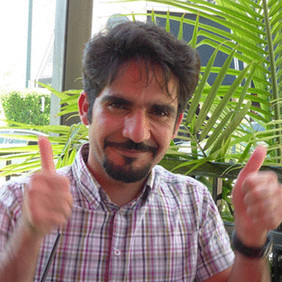
Dr. Hosseinibarkooie comments: “The power of genetic modifiers and their ability to unravel key cellular mechanisms and protein networks that counteract disease-causing processes is a extremely important finding. Most importantly, this knowledge might open new therapeutic avenues in the treatment of individuals with SMA, by allowing the use of genetic modifiers involved in endocytosis".
In the publication Dr. Hosseinibarkooie (first author) and his colleagues describe how protective modifiers are able to rescue the SMA phenotype by improving endocytosis published in the Am J Hum Genet. 2016 with following title:
The Power of Human Protective Modifiers: PLS3 and CORO1C Unravel Impaired Endocytosis in Spinal Muscular Atrophy and Rescue SMA Phenotype.
Hosseinibarkooie S, Peters M, Torres-Benito L, Rastetter RH, Hupperich K, Hoffmann A, Mendoza-Ferreira N, Kaczmarek A, Janzen E, Milbradt J, Lamkemeyer T, Rigo F, Bennett CF, Guschlbauer C, Büschges A, Hammerschmidt M, Riessland M, Kye MJ, Clemen CS, Wirth B.
Am J Hum Genet. 2016 Sep 1;99(3):647-665. doi: 10.1016/j.ajhg.2016.07.014. Epub 2016 Aug 4. PMID:27499521
Mutations in some ubiquitously expressed housekeeping genes have the seemingly paradoxical capability to impair mainly one specific tissue or cell type. A particularly remarkable example of this phenomenon is autosomal recessive spinal muscular atrophy (SMA), a common and devastating motor neuron (MN) disorder caused by a deficit of the ubiquitously expressed housekeeping protein ‘‘survival motor neuron’’ (SMN). SMN is a highly conserved essential protein involved in snRNP biogenesis and splicing; when homozygously knocked out in mice, it causes early embryonic lethality
Dr. Hosseinibarkooie, currently PostDoc in the group of Prof. Dr. Brunhilde Wirth (Inst. of Human Genetics) states: “I am extremely honored to receive the Medical Faculty Award of Science of the best publication of the year 2016. This publication is the outcome of my PhD-research project performed in a collaborative research setting with the input of colleagues, particularly of Miriam Peters, another PhD student and of Prof. Dr. Brunhilde Wirth, the supervisor of my PhD project. Many thanks to all colleagues and to Prof. Brunhilde Wirth - without their support it has not been possible to publish this important research findings."
The pathogenesis of SMA is the result of an autosomal recessive inherited functional loss of the survival muscular neuron 1 gene (SMN1). Humans have two SMN genes, SMN1 and SMN2, which are nearly identical. Due to missplicing of SMN2, only approximately 10% of SMN2 transcripts produce functional SMN protein. Individuals with SMA lack functional SMN1, while the severity of the disease, which varies from early onset at birth to adult onset, is determined primarily by the number of SMN2 copies. Despite SMN being an essential housekeeping protein, SMA is caused by a functional loss of spinal motor neurons that innervate proximal voluntary muscles.
Interestingly, in rare conditions, individuals with SMN1 deletions and only three to four SMN2 copies, a genetic condition usually resulting in an intermediate or mild SMA, are fully asymptomatic. Based on such discordant families with affected and unaffected siblings all carrying the same mutation, previously the Wirth lab identified plastin 3 (PLS3) as a SMA protective modifier. They found that high expression of PLS3 protects against SMA not only in humans but also ameliorates the SMA pathology in zebrafish and mice.
Despite improved motoric abilities due to restored function in motor neurons and neuromuscular junctions, the SMA mice overexpressing PLS3 survived only few days longer. The group showed that SMA mice have impaired inner organs, which could not be rescued by PLS3 overexpression. Consequently, the team reproduced what they found in asymptomatic individuals; they developed a combinatorial therapy using low-dose SMN antisense oligos (ASOs; namely SPINRAZA) that correct SMN2 splicing together with PLS3 overexpression. These mice not only survived over 250 days compared to 14 days in untreated mice, but also showed massive improvement in motor abilities and motor neuron function.
Most importantly, in these paper Dr. Hosseinibarkooie performed a PLS3 interactome analysis and identified coronin 1C (CORO1C) as a novel directly interacting partner of PLS3. Similar to PLS3, also CORO1C overexpression rescued SMA pathology in zebrafish.
Moreover, the identification of PLS3 and CORO1C led to the identification of endocytosis as a basic cellular mechanism disturbed by low SMN level and rescued by both protective modifiers. PLS3 and CORO1C are F-actin binding and bundling proteins. Indeed, F-actin is reduced in cells with low SMN level and SMA mice show disturbed F-actin-dependent processes, including axonal outgrowth and connectivity at NMJs, neurotransmission, and synaptic vesicle recycling. These processes are restored by PLS3 overexpression.
“The power of genetic modifiers and their ability to unravel key cellular mechanisms and protein networks that counteract disease-causing processes is a extremely important finding. Most importantly, this knowledge might open new therapeutic avenues in the treatment of individuals with SMA, by allowing the use of genetic modifiers involved in endocytosis" comments Dr. Hosseinibarkooie.
Prof. Dr. Brundhilde Wirth states: “The research findings of Dr. Hosseinibarkooie obtained during his PhD project on genetic modifiers in SMA indicates strongly that this approach should be expanded to identify disease-related networks and new therapeutic opportunities. After 16 month the publication has been cited 35x in Google Scholar and 23x time in web of science demonstrating the importance of the research finding".
For further information, please contact:
Dr. Mohsenseyed Hosseinibarkooie
Institute of Human Genetics and Center for Molecular Medicine Cologne
seyyed.hosseini-barkooie[at]uk-koeln.de
Prof. Dr. Brunhilde Wirth
Institute of Human Genetics and Center for Molecular Medicine Cologne
brunhilde.wirth[at]uk-koeln.de